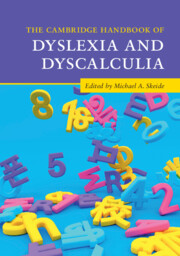Book contents
- The Cambridge Handbook of Dyslexia and Dyscalculia
- The Cambridge Handbook of Dyslexia and Dyscalculia
- Copyright page
- Contents
- Figures and Tables
- Contributors
- Acknowledgements
- General Introduction
- Part I Theoretical Frameworks and Computational Models
- Part II Cognitive Profiles and Behavioural Manifestations
- Part III Genetic and Environmental Influences
- Part IV Neurodevelopmental Foundations
- Part V Gender, Ethnicity, and Socioeconomic Background
- Part VI Cultural Unity and Diversity
- Part VII Early Prediction
- Part VIII Intervention and Compensation
- Part IX Best Practice – Diagnostics and Prevention
- Part X Best Practice – Schooling and Educational Policy
- 24 Dyslexia and the Dyslexia-Like Picture: Supporting All Children in Primary School
- 25 Best Practice and Policy in Maths Education in School
- Summary: Best Practice – Schooling and Educational Policy
- General Summary
- References
- Index
- References
24 - Dyslexia and the Dyslexia-Like Picture: Supporting All Children in Primary School
from Part X - Best Practice – Schooling and Educational Policy
Published online by Cambridge University Press: 28 July 2022
- The Cambridge Handbook of Dyslexia and Dyscalculia
- The Cambridge Handbook of Dyslexia and Dyscalculia
- Copyright page
- Contents
- Figures and Tables
- Contributors
- Acknowledgements
- General Introduction
- Part I Theoretical Frameworks and Computational Models
- Part II Cognitive Profiles and Behavioural Manifestations
- Part III Genetic and Environmental Influences
- Part IV Neurodevelopmental Foundations
- Part V Gender, Ethnicity, and Socioeconomic Background
- Part VI Cultural Unity and Diversity
- Part VII Early Prediction
- Part VIII Intervention and Compensation
- Part IX Best Practice – Diagnostics and Prevention
- Part X Best Practice – Schooling and Educational Policy
- 24 Dyslexia and the Dyslexia-Like Picture: Supporting All Children in Primary School
- 25 Best Practice and Policy in Maths Education in School
- Summary: Best Practice – Schooling and Educational Policy
- General Summary
- References
- Index
- References
Summary
Children typically record dramatic growth in reading skills in primary school. This is not surprising since reading instruction has been placed at the heart of primary school curricula. Irrespective of country, learning outcomes in primary schools everywhere articulate the expectation that children will read, comprehend, and write to express themselves well. This chapter focuses on children who fall behind these stated literacy expectations within their school system, arguing that, while some will qualify for the diagnosis of dyslexia, all those who struggle will need a measured response from the primary school system. A cursory look at the decision-making framework that primary schools follow for those who fall behind shows variation across countries and also within countries, including those that have a well-articulated protocol of referral and response. Given this, it is useful to think of school systems as placed at different points on a continuum of support, with schools that have no discernable provisions and schools with multilayered provisions put at either extreme. This variety may reflect differences in access to resources for screening, diagnostic testing, and tiers of targeted interventions.
- Type
- Chapter
- Information
- The Cambridge Handbook of Dyslexia and Dyscalculia , pp. 427 - 443Publisher: Cambridge University PressPrint publication year: 2022
References
Suggestions for Further Reading
- 1
- Cited by



